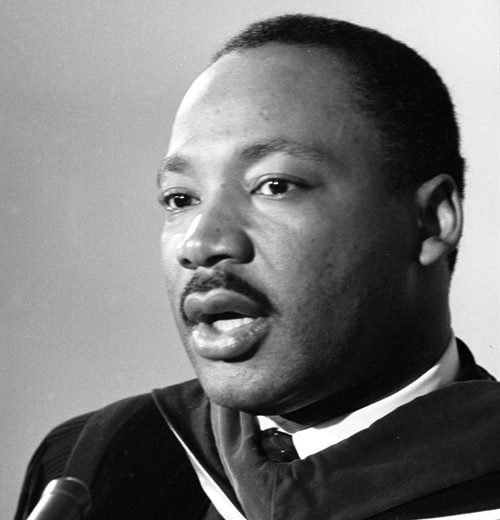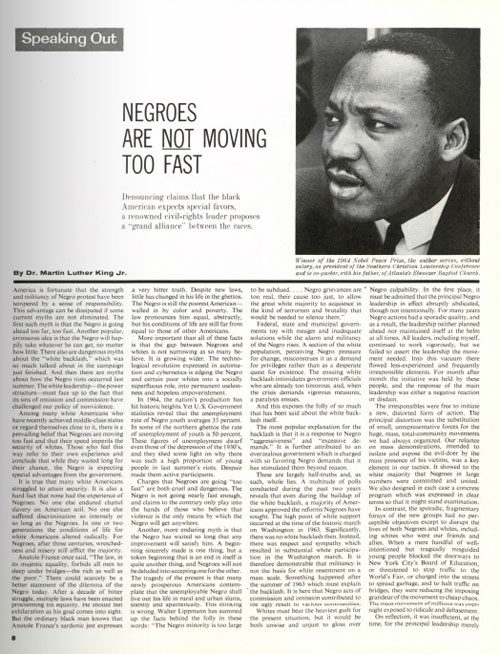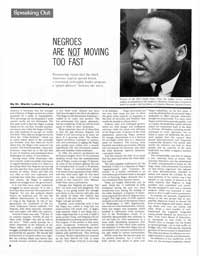“The Pace of Change” by Martin Luther King Jr.
The March on Washington in 1963 seemed to herald a new era in civil rights. But in the following year, the persistence of “grinding poverty” drove some Black Americans to violence. Was progress toward equality and integration taking place too quickly, as some believed? In 1964, Dr. Martin Luther King Jr., responded to that question in the essay excerpted below.
Despite new laws, little has changed in his life in the ghettos. The Negro is still the poorest American walled in by color and poverty. The law pronounces him equal, abstractly, but his conditions of life are still far from equal to those of other Americans. The gap between Negroes and whites is not narrowing as so many believe. It is growing wider.
Charges that Negroes are going “too fast” are both cruel and dangerous. The Negro is not going nearly fast enough, and claims to the contrary only play into the hands of those who believe that violence is the only means by which the Negro will get anywhere.
Another, more enduring myth is that the Negro has waited so long that any improvement will satisfy him. A beginning sincerely made is one thing, but a token beginning that is an end in itself is quite another thing, and Negroes will not be deluded into accepting one for the other. The tragedy of the present is that many newly prosperous Americans contemplate that the unemployable Negro shall live out his life in rural and urban slums, silently and apathetically. This thinking is wrong.

Federal, state, and municipal governments toy with meager and inadequate solutions while the alarm and militancy of the Negro rises. A section of the white population, perceiving Negro pressure for change, misconstrues it as a demand for privileges rather than as a desperate quest for existence. In 1963, at the time of the Washington march, the whole nation talked of Negro freedom, and the Negro began to believe in its reality. Then shattered dreams and the persistence of grinding poverty drove a small but desperate group of Negroes into the swamp of senseless violence. Riots solved nothing, but they stunned the nation. One of the questions they evoked was doubt about the Negro’s attachment to the doctrine of nonviolence.
Is the dilemma impossible of resolution? The best course for the Negro happens to be the best course for whites as well and for the nation as a whole. There must be a grand alliance of Negro and white. This alliance must consist of the vast majorities of each group. It must have the objective of eradicating social evils which oppress both white and Negro. It is not only more moral for both races to work together but more logical.
The majority of Negroes want an alliance with white Americans to tackle the social injustices that afflict both of them. If a few Negro extremists and white extremists manage to divide their people, the tragic result will be the ascendancy of extreme reaction which exploits all people.
Our nation has absorbed many minorities from all nations of the world. Many reforms were necessary — labor laws and social-welfare measures — to achieve this result. We accomplished these changes in the past because there was a will to do it, and because the nation became greater and stronger in the process. Our country has the need and capacity for further growth, and today there are enough Americans, Negro and white, with faith in the future, with compassion and will to repeat the bright experience of our past.
—“Negroes Are Not Moving Too Fast” by Dr. Martin Luther King Jr., November 7, 1964

This article appears in the March/April 2018 issue of The Saturday Evening Post. Subscribe to the magazine for more art, inspiring stories, fiction, humor, and features from our archives.
Charles Osgood: The Hard Part
Some things in life come smoothly and easily. Not everything, though. Sooner or later, we come to the hard part. Even then we Americans tend to be optimistic about getting past bumps and obstacles to a point where the road is smooth again and dreams can come true.
I remember when I was a kid seeing a sign in a hardware store in Baltimore: “The difficult we do immediately, the impossible takes a little longer.” Even then that struck me as a great attitude. “We Shall Overcome” would be the anthem of the American civil rights movement. Pete Seeger showed the old song to Dr. Martin Luther King Jr., suggesting one little change. Originally, it was we “WILL” overcome. Nothing philosophical, Seeger once told me. He just thought “SHALL” would sing better. It sang very well indeed.
By then Johnny Mercer had written the words to another very popular song referencing the biblical stories of Jonah in the whale and Noah in the Ark. “What did they do, just when everything looked so dark?” The answer, you may recall, was to “accentuate the positive, eliminate the negative, and don’t mess with Mr. In-Between.” Of course in real life you can accentuate the positive all you want, but the negative keeps popping up, as does that ubiquitous “In-Between” guy you don’t want to mess with.
I’ve done a number of commencement addresses over the years, and one year I did two. One was at a full-fledged university in upstate New York, and the other at a private elementary school about a block and a half from our house in New Jersey. I wanted to say the same thing to both graduating classes, even though the average age of one class was 21, and the average age of the other was 11. What I wanted both groups to understand was that people would keep warning them that the “hard part” was coming right up, and that they should adjust their expectations accordingly.
At each level, they would be told that things would be a lot more difficult at the next level. Most of us go through each stage of our lives worrying that we won’t be good enough to measure up to the demands and requirements of the next.
My own experience has been that each successive level failed to be as oppressive as advertised. Same thing in the military where I would be assigned the duties of announcer for The United States Army Band (a tough job, but somebody had to do it). And same thing in the world of professional broadcast journalism where I’ve found steady employment for 54 years now, although, I never took a single course in journalism or broadcasting. My degree at Fordham was a Bachelor of Science (B.S.) in Economics. In more than a half a century of broadcast experience, I have discovered that a little B.S. will take you a long way. Although, it’s still true I continue to worry that the hard part is not far off, and that I’ll be found out any day now.
I wanted the young graduates to know that if they were worried about the future and felt a bit insecure, they had plenty of company and that everything would work out for the best. I offered both this little poem, which I’ve updated for you:
Life is earnest; life is
real up to the very end.
And the hard part,
everybody says, is just around the bend.
But here’s a little secret
that I want to share with you:
What is true for other people
need not be the case for you.
When they tell you that the hard part
starts in just a little while,
Look worried if you want to,
but inside of you just smile.
In the years since I wrote those words,
they still seem mostly true,
With corrections and revisions
that I now pass on to you.
“Yes, we can” beats “No, we can’t” in an election every time.
With such words, there are no limits to how far one can climb.
It’s the way to win the voters’ spirits, minds, and hearts,
But after you have done so, that’s when the hard part starts.
President Obama to Speak at NAACP
A Proud Moment in a Long Struggle
President Obama will be in New York on July 16 speaking to a crowd of 10,000 people. While he has addressed much larger groups, rarely has he spoken on such a significant occasion: America’s first black president will be giving the keynote speech at the 100th birthday celebration of the National Association for the Advancement of Colored People (NAACP).
The NAACP was formed in 1909 to address a rising opposition to civil rights. Racism in America was discarding its subtlety, coming out in the open, and making a new bid for power. Southern legislators had enacted new laws that made it difficult, if not impossible, for black Americans to vote. Racial tensions ignited race riots, and more were coming.
Dr. W.E.B. DuBois edited the NAACP’s magazine, The Crisis, and helped frame the association’s goal:
“To promote equality of rights and to eradicate caste or race prejudice among the citizens of the United States; to advance the interest of colored citizens; to secure for the impartial suffrage; and to increase their opportunities for securing justice in the court, education for the children, employment according to their ability and complete equality before law.”
The early years were daunting and Washington extended little sympathy for the cause. The NAACP addressed the need to end official segregation, promote black men to officers in the military, and oppose the rising enrollment in the Ku Klux Klan. The effort met consistent opposition from southern legislators who blocked federal legislation against lynching.
Halfway through its first century, the NAACP was confronting racism as virulent as ever. Black Americans were achieving some of their goals, but they were also being accused of seeking their rights too aggressively.

Dr. Martin Luther King, Jr.
Nov. 7, 1964
In the November 7, 1964, Post, Dr. Martin Luther King addressed this issue directly in his article, “Negroes Are Not Moving Too Fast.”
“Among many white Americans who have recently achieved middle-class status or regard themselves close to it, there is a prevailing belief that Negroes are moving too fast and that their speed imperils the security of whites. Those who feel this way refer to their own experience and conclude that while they waited long for their chance, the Negro is expecting special advantages from the government. It is true that many white Americans struggled to attain security. It is also a hard fact that none had the experience of Negroes. No one else endured chattel slavery on American soil. No one else suffered discrimination so intensely or so long as the Negroes. In one or two generations the conditions of life for white Americans altered radically. For Negroes, after three centuries, wretchedness and misery still afflict the majority.
“Anatole France once said, ‘The law, in its majestic equality, forbids all men to sleep under bridges—the rich as well as the poor.’ There could scarcely be a better statement of the dilemma of the Negro today. After a decade of bitter struggle, multiple laws have been enacted proclaiming his equality. He should feel exhilaration as his goal comes into sight. But the ordinary black man knows that Anatole France’s sardonic jest expresses a very bitter truth. Despite new laws, little has changed in his life in the ghettos. …
“Charges that Negroes are going ‘too fast’ are both cruel and dangerous. The Negro is not going nearly fast enough, and claims to the contrary only play into the hands of those who believe that violence is the only means by which the Negro will get anywhere. …
“A section of the white population, perceiving Negro pressure for change, misconstrues it as a demand for privileges rather than as a desperate quest for existence. The ensuing white backlash intimidates government officials who are already too timorous, and, when the crisis demands vigorous measures, a paralysis ensues. …
“Our nation has absorbed many minorities from all nations of the world. In the beginning of this century, in a single decade, almost nine million immigrants were drawn into our society. Many reforms were necessary—labor laws and social-welfare measures— to achieve this result. We accomplished these changes in the past because there was a will to do it, and because the nation became greater and stronger in the process. Our country has the need and capacity for further growth, and today there are enough Americans, Negro and white, with faith in the future, with compassion, and will to repeat the bright experience of our past.”
The NAACP has no reason to close operations this year. There is, alas, still more work ahead. However, we hope they, and the country, savor the moment when President Obama shares the podium with America’s first black secretary of state, Colin Powell, and our first black attorney general, Eric Holder. America should be very proud of this organization and the long dedication of its generations of members.